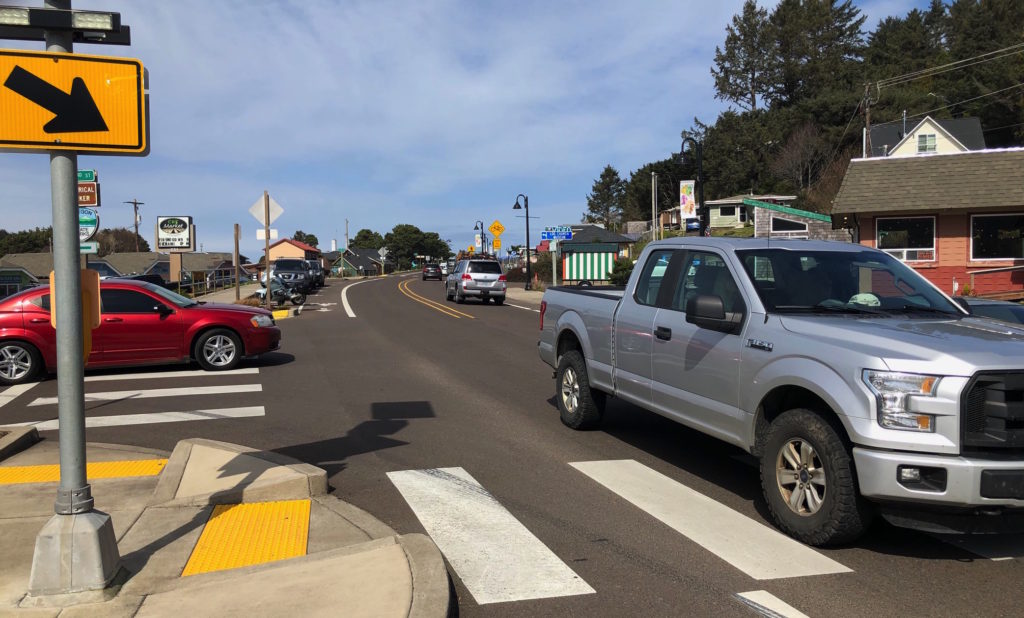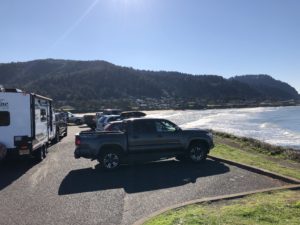
By SUZANNE ROIG/Oregon Capital Bureau
Oregon’s natural beauty is the No.1 draw for visitors, but breweries, restaurants and shopping rank second, according to a survey by the Oregon Values and Beliefs Center.
But with that attraction comes angst from residents who feel tourism makes biking, hiking, fishing and camping more difficult to enjoy, according to the May 6-12 survey of 1,674 residents 18 and older.
“More people are moving here, and there are already too many people,” said Daniel Olson, a 75-year-old Deschutes County resident. “Ultimately it increases traffic and drives up costs, especially housing.”
Olson’s comments mirror the survey, where 61 percent of the respondents believe that tourism causes traffic in their community.
But two-thirds of those surveyed believed that tourism brings benefits, particularly economic ones, which is the same as when surveyed in 2021, according to the center.
“This is a most important industry in our area, but (we) can be overrun with tourists at times, making it difficult to move around the area and conduct necessary business especially for people my age,” Bob Finch, a 75-year-old Deschutes County man, wrote in the open-ended questions. “We love this area and have learned to adjust to the busy conditions because a strong economy is necessary for the area to continue to grow and prosper.”
It’s great that the majority of residents surveyed recognize the positive impact of tourism on an economy, said Kevney Dugan, chief executive officer of Visit Bend. In fact, the nonprofit marketing organization invests in research and partnerships, including one with Oregon State University-Cascades to learn more about how the community views the visitor industry.
“We recognize change can be hard to work through and our current influx of new residents and visitors to the state has created a new normal for all of us,” Dugan said. “(We want) to better understand the community sentiment… while also working to reduce pain points that come with growth and change.”

Just about half of those surveyed supported a tourist fee for peak seasons that can be given to the affected communities. The survey showed that 51 percent believe tourism contributes funds to public services, 48 percent said it provided a high quality of life and 48 percent said it offered well-paying jobs.
Despite the criticism of tourism, most surveyed recognized the benefits to the state and foresee an increase in visitors this summer will be a positive for their community, according to the survey. About eight in 10 residents 75 and older say tourism contributes to a strong economy. But among the 18- to 29-year-olds that belief drops significantly to 58 percent, according to the survey.
More than half of those surveyed in the under 30 age group — 56 percent — believe tourism contributed to the lack of affordable housing, according to the survey. But about 34 percent to 50 percent in all other age groups surveyed believe tourism is a contributing factor to the lack of affordable housing, according to the survey.
Of note is that one-third of those surveyed in the under 30 age group say recreational marijuana is a tourist draw, according to the survey.
Oregon Values & Beliefs Center methodology
The survey was conducted online among Oregonians 18 and older from professionally maintained online panels. The polling group said its surveys are within the statistically valid margin of error. The nonprofit is building a large research panel of Oregonians to ensure that all voices are represented in discussions of public policy in a valid and statistically reliable way. Selected panelists earn points for their participation, which can be redeemed for cash or donated to a charity. To learn more, visit oregonvbc.org/about-the-panel
- The Oregon Capital Bureau is staffed by reporters from EO Media and Pamplin Media Group and provides state government and political news to their newspapers and media around Oregon, including YachatsNews.com



Tourism. Public opinion and economic facts are often two quite different pieces of information and should not be confused. For example, “48 percent said it [tourism] offered well-paying jobs.” Have our public officials actually analyzed the jobs created by tourism? If so, what is the average wage?
Perhaps tourism does create a strong economy. But what does that mean? Lower taxes? Apparently not. More revenue from room taxes? Yes. More affordable housing? Obviously the reverse. The list of questions that should inform tourism policy goes on and on.
But long and short is that we have yet to see any well done analysis of both economic benefits and burdens. Nor have we seen who gets the benefits and who bears the burdens.
The lack of affordable housing is probably one of the big burdens since so much of the housing supply is reserved for tourists. But maybe I’m wrong since we don’t know how much of the housing supply is reserved for tourists and what impact on home prices might occur if those homes were sold or rented to permanent residents. Tourist rentals also drive up market value. Property tax is a wealth tax on homeowners. It is especially burdensome to those home owners on fixed incomes. As our astute state Rep. David Gomberg has pointed out, the only relief for older home owners is the option to delay tax payments and pass the burden plus interest on to heirs.
It would behoove our commissioners who have not hesitated to pour hundreds of thousands into consulting fees for a proposed “commons” to invest a little to analyze the costs and benefits of tourism and who pays the costs and who gets the benefits and how to maximize the benefits and minimize the costs.